- Home
- Elmore Leonard
Three-Ten to Yuma and Other Stories Page 7
Three-Ten to Yuma and Other Stories Read online
Page 7
5
The Captives
Chapter One
HE COULD HEAR the stagecoach, the faraway creaking and the muffled rumble of it, and he was thinking: It’s almost an hour early. Why should it be if it left Contention on schedule?
His name was Pat Brennan. He was lean and almost tall, with a deeply tanned, pleasant face beneath the straight hat brim low over his eyes, and he stood next to his saddle, which was on the ground, with the easy, hip-shot slouch of a rider. A Henry rifle was in his right hand and he was squinting into the sun glare, looking up the grade to the rutted road that came curving down through the spidery Joshua trees.
He lowered the Henry rifle, stock down, and let it fall across the saddle, and kept his hand away from the Colt holstered on his right leg. A man could get shot standing next to a stage road out in the middle of nowhere with a rifle in his hand.
Then, seeing the coach suddenly against the sky, billowing dust hanging over it, he felt relief and smiled to himself and raised his arm to wave as the coach passed through the Joshuas.
As the pounding wood, iron, and three-team racket of it came swaying toward him, he raised both arms and felt a sudden helplessness as he saw that the driver was making no effort to stop the teams. Brennan stepped back quickly, and the coach rushed past him, the driver, alone on the boot, bending forward and down to look at him.
Brennan cupped his hands and called, “Rintoooon!”
The driver leaned back with the reins high and through his fingers, his boot pushing against the brake lever, and his body half turned to look back over the top of the Concord. Brennan swung the saddle up over his shoulder and started after the coach as it ground to a stop.
He saw the company name, HATCH & HODGES, and just below it, Number 42 stenciled on the varnished door; then from a side window, he saw a man staring at him irritably as he approached. Behind the man he caught a glimpse of a woman with soft features and a small, plumed hat and eyes that looked away quickly as Brennan’s gaze passed them going up to Ed Rintoon, the driver.
“Ed, for a minute I didn’t think you were going to stop.”
Rintoon, a leathery, beard-stubbled man in his mid-forties, stood with one knee on the seat and looked down at Brennan with only faint surprise.
“I took you for being up to no good, standing there waving your arms.”
“I’m only looking for a lift a ways.”
“What happened to you?”
Brennan grinned and his thumb pointed back vaguely over his shoulder. “I was visiting Tenvoorde to see about buying some yearling stock and I lost my horse to him on a bet.”
“Driver!”
Brennan turned. The man who had been at the window was now leaning halfway out of the door and looking up at Rintoon.
“I’m not paying you to pass the time of day with”—he glanced at Brennan—“with everybody we meet.”
Rintoon leaned over to look down at him. “Willard, you ain’t even part right, since you ain’t the man that pays me.”
“I chartered this coach, and you along with it!” He was a young man, hatless, his long hair mussed from the wind. Strands of it hung over his ears, and his face was flushed as he glared at Rintoon. “When I pay for a coach I expect the service that goes with it.”
Rintoon said, “Willard, you calm down now.”
“Mr. Mims!”
Rintoon smiled faintly, glancing at Brennan. “Pat, I’d like you to meet Mr. Mims.” He paused, adding, “He’s a bookkeeper.”
Brennan touched the brim of his hat toward the coach, seeing the woman again. She looked to be in her late twenties and her eyes now were wide and frightened and not looking at him.
His glance went to Willard Mims. Mims came out of the doorway and stood pointing a finger up at Rintoon.
“Brother, you’re through! I swear to God this is your last run on any line in the Territory!”
Rintoon eased himself down until he was half sitting on the seat. “You wouldn’t kid me.”
“You’ll see if I’m kidding!”
Rintoon shook his head. “After ten years of faithful service the boss will be sorry to see me go.”
Willard Mims stared at him in silence. Then he said, his voice calmer, “You won’t be so sure of yourself after we get to Bisbee.”
Ignoring him, Rintoon turned to Brennan. “Swing that saddle up here.”
“You hear what I said?” Willard Mims flared.
Reaching down for the saddle horn as Brennan lifted it, Rintoon answered, “You said I’d be sorry when we got to Bisbee.”
“You remember that!”
“I sure will. Now you get back inside, Willard.” He glanced at Brennan. “You get in there, too, Pat.”
Willard Mims stiffened. “I’ll remind you again—this is not the passenger coach.”
Brennan was momentarily angry, but he saw the way Rintoon was taking this and he said calmly, “You want me to walk? It’s only fifteen miles to Sasabe.”
“I didn’t say that,” Mims answered, moving to the coach door. “If you want to come, get up on the boot.” He turned to look at Brennan as he pulled himself up on the foot rung. “If we’d wanted company we’d have taken the scheduled run. That clear enough for you?”
Glancing at Rintoon, Brennan swung the Henry rifle up to him and said, “Yes, sir,” not looking at Mims; and he winked at Rintoon as he climbed the wheel to the driver’s seat.
A moment later they were moving, slowly at first, bumping and swaying; then the road seemed to become smoother as the teams pulled faster.
Brennan leaned toward Rintoon and said, in the noise, close to the driver’s grizzled face, “I wondered why the regular stage would be almost an hour early, Ed, I’m obliged to you.”
Rintoon glanced at him. “Thank Mr. Mims.”
“Who is he, anyway?”
“Old man Gateway’s son-in-law. Married the boss’s daughter. Married into the biggest copper claim in the country.”
“The girl with him his wife?”
“Doretta,” Rintoon answered. “That’s Gateway’s daughter. She was scheduled to be an old maid till Willard come along and saved her from spinsterhood. She’s plain as a ’dobe wall.”
Brennan said, “But not too plain for Willard, eh?”
Rintoon gave him a side glance. “Patrick, there ain’t nothing plain about old man Gateway’s holdings. That’s the thing. Four years ago he bought a half interest in the Montezuma Copper Mine for two hundred and fifty thousand dollars, and he’s got it back triple since then. Can you imagine anyone having that much money?”
Brennan shook his head. “Where’d he get it, to start?”
“They say he come from money and made more by using the brains God gave him, investing it.”
Brennan shook his head again. “That’s too much money, Ed. Too much to have to worry about.”
“Not for Willard, it ain’t,” Rintoon said. “He started out as a bookkeeper with the company. Now he’s general manager—since the wedding. The old man picked Willard because he was the only one around he thought had any polish, and he knew if he waited much longer he’d have an old maid on his hands. And, Pat”—Rintoon leaned closer—“Willard don’t talk to the old man like he does to other people.”
“She didn’t look so bad to me,” Brennan said.
“You been down on Sasabe Creek too long.” Rintoon glanced at him again. “What were you saying about losing your horse to Tenvoorde?”
“Oh, I went to see him about buying some yearlings—”
“On credit,” Rintoon said.
Brennan nodded. “Though I was going to pay him some of it cash. I told him to name a fair interest rate and he’d have it in two years. But he said no. Cash on the line. No cash, no yearlings. I needed three hundred to make the deal, but I only had fifty. Then when I was going he said, ‘Patrick’—you know how he talks—‘I’ll give you a chance to get your yearlings free,’ and all the time he’s eyeing this claybank mare I had along. He said
, ‘You bet your mare and your fifty dollars cash, I’ll put up what yearlings you need, and we’ll race your mare against one of my string for the winner.’”
Ed Rintoon said, “And you lost.”
“By a country mile.”
“Pat, that don’t sound like you. Why didn’t you take what your fifty would buy and get on home?”
“Because I needed these yearlings plus a good seed bull. I could’ve bought the bull, but I wouldn’t have had the yearlings to build on. That’s what I told Mr. Tenvoorde. I said, ‘This deal’s as good as the stock you’re selling me. If you’re taking that kind of money for a seed bull and yearlings, then you know they can produce. You’re sure of getting your money.’”
“You got stock down on your Sasabe place,” Rintoon said.
“Not like you think. They wintered poorly and I got a lot of building to do.”
“Who’s tending your herd now?”
“I still got those two Mexican boys.”
“You should’ve known better than to go to Tenvoorde.”
“I didn’t have a chance. He’s the only man close enough with the stock I want.”
“But a bet like that—how could you fall into it? You know he’d have a pony to outstrip yours.”
“Well, that was the chance I had to take.”
They rode along in silence for a few minutes before Brennan asked, “Where they coming from?”
Rintoon grinned at him. “Their honeymoon. Willard made the agent put on a special run just for the two of them. Made a big fuss while Doretta tried to hide her head.”
“Then”—Brennan grinned—“I’m obliged to Mr. Mims, else I’d still be waiting back there with my saddle and my Henry.”
Later on, topping a rise that was thick with jack pine, they were suddenly in view of the Sasabe station and the creek beyond it, as they came out of the trees and started down the mesquite-dotted sweep of the hillside.
Rintoon checked his timepiece. The regular run was due here at five o’clock. He was surprised to see that it was only ten minutes after four. He remembered then, his mind picturing Willard Mims as he chartered the special coach.
Brennan said, “I’m getting off here at Sasabe.”
“How’ll you get over to your place?”
“Hank’ll lend me a horse.”
As they drew nearer, Rintoon was squinting, studying the three adobe houses and the corral in back. “I don’t see anybody,” he said. “Hank’s usually out in the yard. Him or his boy.”
Brennan said, “They don’t expect you for an hour. That’s it.”
“Man, we make enough noise for somebody to come out.”
Rintoon swung the teams toward the adobes, slowing them as Brennan pushed his boot against the brake lever, and they came to a stop exactly even with the front of the main adobe.
“Hank!”
Rintoon looked from the door of the adobe out over the yard. He called the name again, but there was no answer. He frowned. “The damn place sounds deserted,” he said.
Brennan saw the driver’s eyes drop to the sawed-off shotgun and Brennan’s Henry on the floor of the boot, and then he was looking over the yard again.
“Where in hell would Hank’ve gone to?”
A sound came from the adobe. A boot scraping—that or something like it—and the next moment a man was standing in the open doorway. He was bearded, a dark beard faintly streaked with gray and in need of a trim. He was watching them calmly, almost indifferently, and leveling a Colt at them at the same time.
He moved out into the yard and now another man, armed with a shotgun, came out of the adobe. The bearded one held his gun on the door of the coach. The shotgun was leveled at Brennan and Rintoon.
“You-all drop your guns and come on down.” He wore range clothes, soiled and sun bleached, and he held the shotgun calmly as if doing this was not something new. He was younger than the bearded one by at least ten years.
Brennan raised his revolver from its holster and the one with the shotgun said, “Gently, now,” and grinned as Brennan dropped it over the wheel.
Rintoon, not wearing a handgun, had not moved.
“If you got something down in that boot,” the one with the shotgun said to him, “haul it out.”
Rintoon muttered something under his breath. He reached down and took hold of Brennan’s Henry rifle lying next to the sawed-off shotgun, his finger slipping through the trigger guard. He came up with it hesitantly, and Brennan whispered, barely moving his lips, “Don’t be crazy.”
Standing up, turning, Rintoon hesitated again, then let the rifle fall. “That all you got?”
Rintoon nodded. “That’s all.”
“Then come on down.”
Rintoon turned his back. He bent over to climb down, his foot reaching for the wheel below, and his hand closed on the sawed-off shotgun. Brennan whispered, “Don’t do it!”
Rintoon mumbled something that came out as a growl. Brennan leaned toward him as if to give him a hand down. “You got two shots. What if there’re more than two of them?”
Rintoon grunted, “Look out, Pat!” His hand gripped the shotgun firmly.
Then he was turning, jumping from the wheel, the stubby scattergun flashing head-high—and at the same moment a single revolver shot blasted the stillness. Brennan saw Rintoon crumple to the ground, the shotgun falling next to him, and he was suddenly aware of powder smoke and a man framed in the window of the adobe.
The one with the shotgun said, “Well, that just saves some time,” and he glanced around as the third man came out of the adobe. “Chink, I swear you hit him in midair.”
“I was waiting for that old man to pull something,” said the one called Chink. He wore two low-slung, crossed cartridge belts and his second Colt was still in its holster.
Brennan jumped down and rolled Rintoon over gently, holding his head off the ground. He looked at the motionless form and then at Chink. “He’s dead.”
Chink stood with his legs apart and looked down at Brennan indifferently. “Sure he is.”
“You didn’t have to kill him.”
Chink shrugged. “I would’ve, sooner or later.”
“Why?”
“That’s the way it is.”
The man with the beard had not moved. He said now, quietly, “Chink, you shut your mouth.” Then he glanced at the man with the shotgun and said, in the same tone, “Billy-Jack, get them out of there,” and nodded toward the coach.
Chapter Two
Kneeling next to Rintoon, Brennan studied them. He watched Billy-Jack open the coach door, saw his mouth soften to a grin as Doretta Mims came out first. Her eyes went to Rintoon, but shifted away quickly. Willard Mims hesitated, then stepped down, stumbling in his haste as Billy-Jack pointed the shotgun at him. He stood next to his wife and stared unblinkingly at Rintoon’s body.
That one, Brennan was thinking, looking at the man with the beard—that’s the one to watch. He’s calling it, and he doesn’t look as though he gets excited…. And the one called Chink….
Brennan’s eyes went to him. He was standing hip-cocked, his hat on the back of his head and the drawstring from it pulled tight beneath his lower lip, his free hand fingering the string idly, the other hand holding the long-barreled .44 Colt, pointed down but cocked.
He wants somebody to try something, Brennan thought. He’s itching for it. He wears two guns and he thinks he’s good. Well, maybe he is. But he’s young, the youngest of the three, and he’s anxious. His gaze stayed on Chink and it went through his mind: Don’t even reach for a cigarette when he’s around.
The one with the beard said, “Billy-Jack, get up on top of the coach.”
Brennan’s eyes raised, watching the man step from the wheel hub to the boot and then kneel on the driver’s seat. He’s number-three man, Brennan thought. He keeps looking at the woman. But don’t bet him short. He carries a big-gauge gun.
“Frank, there ain’t nothing up here but an old saddle.”
The
one with the beard—Frank Usher—raised his eyes. “Look under it.”
“Ain’t nothing there either.”
Usher’s eyes went to Willard Mims, then swung slowly to Brennan. “Where’s the mail?”
“I wouldn’t know,” Brennan said.
Frank Usher looked at Willard Mims again. “You tell me.”
“This isn’t the stage,” Willard Mims said hesitantly. His face relaxed then, almost to the point of smiling. “You made a mistake. The regular stage isn’t due for almost an hour.” He went on, excitement rising in his voice, “That’s what you want, the stage that’s due here at five. This is one I chartered.” He smiled now. “See, me and my wife are just coming back from a honeymoon and, you know—”
Frank Usher looked at Brennan. “Is that right?”
“Of course it is!” Mims’s voice rose. “Go in and check the schedule.”
“I’m asking this man.”
Brennan shrugged. “I wouldn’t know.”
“He don’t know anything,” Chink said.
Billy-Jack came down off the coach and Usher said to him, “Go in and look for a schedule.” He nodded toward Doretta Mims. “Take that woman with you. Have her put some coffee on, and something to eat.”
Brennan said, “What did you do with Hank?”
Frank Usher’s dull eyes moved to Brennan. “Who’s he?”
“The station man here.”
Chink grinned and waved his revolver, pointing it off beyond the main adobe. “He’s over yonder in the well.”
Usher said, “Does that answer it?”
“What about his boy?”
“He’s with him,” Usher said. “Anything else?”
Brennan shook his head slowly. “That’s enough.” He knew they were both dead and suddenly he was very much afraid of this dull-eyed, soft-voiced man with the beard; it took an effort to keep himself calm. He watched Billy-Jack take Doretta by the arm. She looked imploringly at her husband, holding back, but he made no move to help her. Billy-Jack jerked her arm roughly and she went with him.
Willard Mims said, “He’ll find the schedule. Like I said, it’s due at five o’clock. I can see how you made the mistake”—Willard was smiling—“thinking we were the regular stage. Hell, we were just going home…down to Bisbee. You’ll see, five o’clock sharp that regular passenger-mail run’ll pull in.”

 Charlie Martz and Other Stories: The Unpublished Stories
Charlie Martz and Other Stories: The Unpublished Stories Elmore Leonard's Western Roundup #2
Elmore Leonard's Western Roundup #2 Fire in the Hole
Fire in the Hole Tishomingo Blues (2002)
Tishomingo Blues (2002)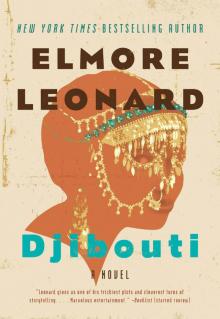 Djibouti
Djibouti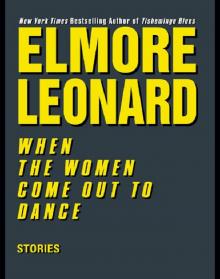 When the Women Come Out to Dance: Stories
When the Women Come Out to Dance: Stories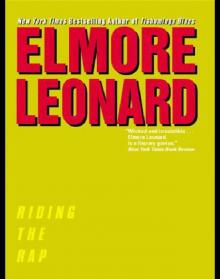 Riding the Rap
Riding the Rap Moment of Vengeance and Other Stories
Moment of Vengeance and Other Stories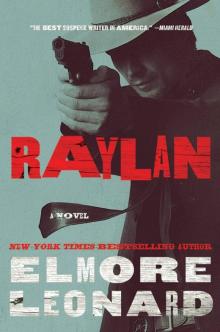 Raylan
Raylan Touch
Touch Mr Majestyk
Mr Majestyk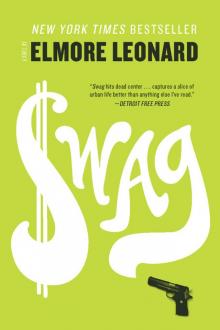 Swag
Swag Road Dogs
Road Dogs La Brava
La Brava The Hot Kid
The Hot Kid Valdez Is Coming: A Novel
Valdez Is Coming: A Novel Be Cool
Be Cool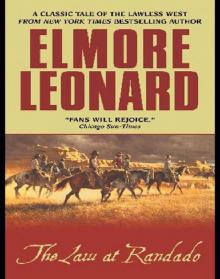 The Law at Randado
The Law at Randado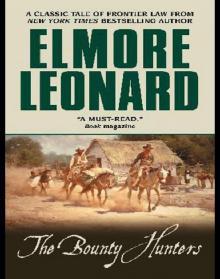 The Bounty Hunters
The Bounty Hunters When the Women Come Out to Dance
When the Women Come Out to Dance 310 to Yuma and Other Stories (1953)
310 to Yuma and Other Stories (1953)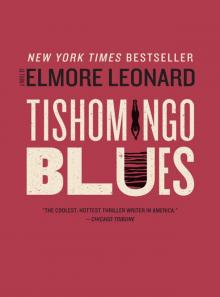 Tishomingo Blues
Tishomingo Blues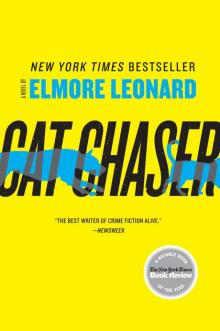 Cat Chaser
Cat Chaser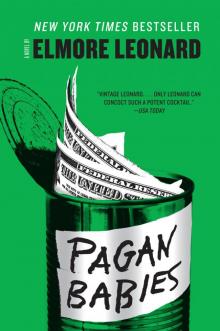 Pagan Babies
Pagan Babies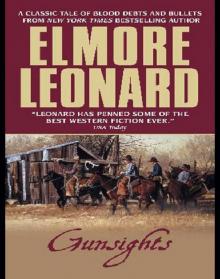 Elmore Leonard's Western Roundup #1
Elmore Leonard's Western Roundup #1 52 Pickup
52 Pickup Stick
Stick The Moonshine War
The Moonshine War Valdez Is Coming
Valdez Is Coming City Primeval
City Primeval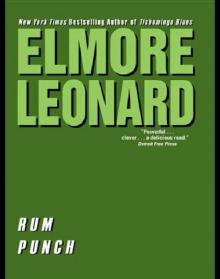 Rum Punch
Rum Punch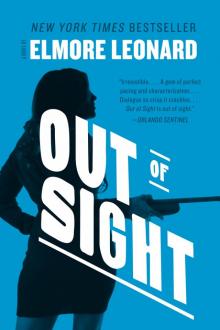 Out of Sight
Out of Sight Naked Came the Manatee (1996)
Naked Came the Manatee (1996)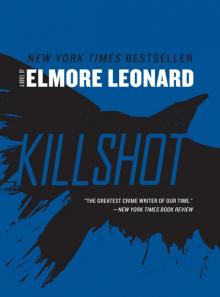 Killshot
Killshot Cuba Libre
Cuba Libre Forty Lashes Less One
Forty Lashes Less One The Complete Western Stories of Elmore Leonard
The Complete Western Stories of Elmore Leonard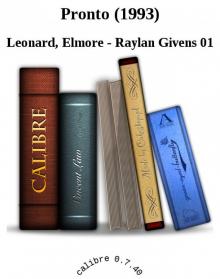 Pronto
Pronto Split Images
Split Images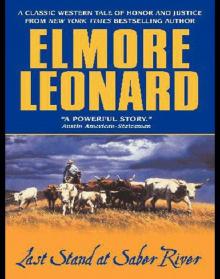 Last Stand at Saber River
Last Stand at Saber River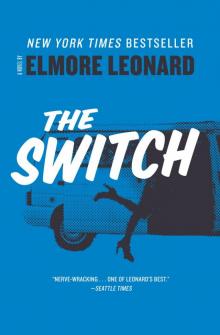 The Switch
The Switch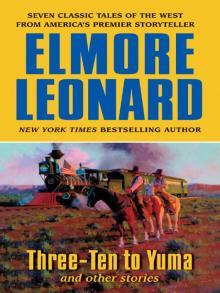 Three-Ten to Yuma and Other Stories
Three-Ten to Yuma and Other Stories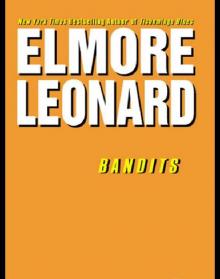 Bandits
Bandits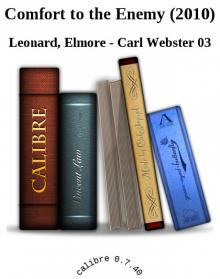 Comfort to the Enemy and Other Carl Webster Stories
Comfort to the Enemy and Other Carl Webster Stories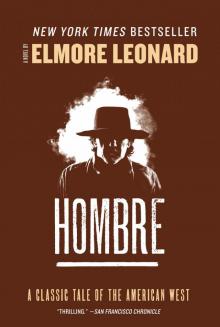 Hombre
Hombre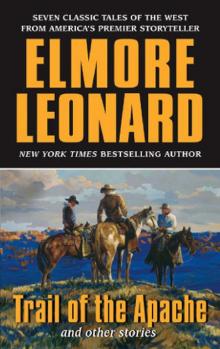 Trail of the Apache and Other Stories
Trail of the Apache and Other Stories LaBrava
LaBrava Gold Coast
Gold Coast Jackie Brown
Jackie Brown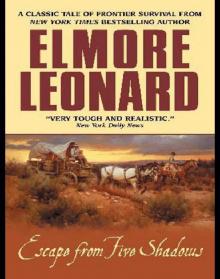 Escape From Five Shadows
Escape From Five Shadows Karen Makes out (1996)
Karen Makes out (1996)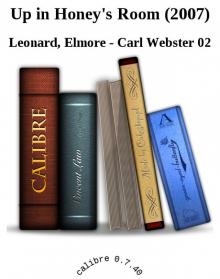 Up in Honey's Room
Up in Honey's Room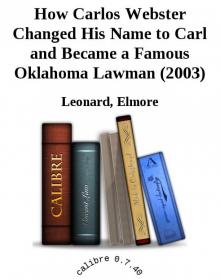 How Carlos Webster Changed His Name to Carl and Became a Famous Oklahoma Lawman (2003)
How Carlos Webster Changed His Name to Carl and Became a Famous Oklahoma Lawman (2003)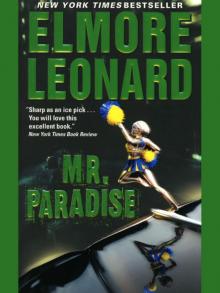 Mr. Paradise
Mr. Paradise The Hunted
The Hunted Freaky Deaky
Freaky Deaky Louly and Pretty Boy (Ss)
Louly and Pretty Boy (Ss)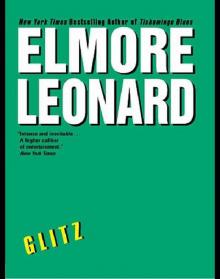 Glitz
Glitz A Coyote's in the House
A Coyote's in the House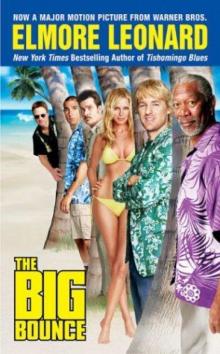 The Big Bounce jr-1
The Big Bounce jr-1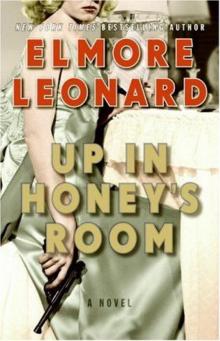 Up in Honey's Room cw-2
Up in Honey's Room cw-2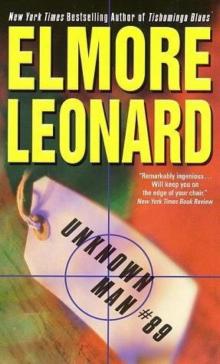 Unknown Man #89 jr-3
Unknown Man #89 jr-3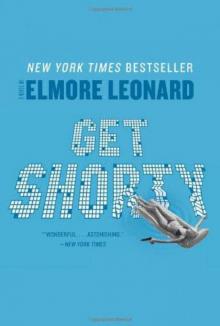 Get Shorty: A Novel cp-1
Get Shorty: A Novel cp-1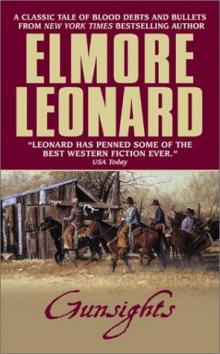 Gunsights
Gunsights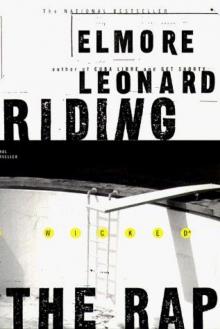 Riding the Rap rg-2
Riding the Rap rg-2